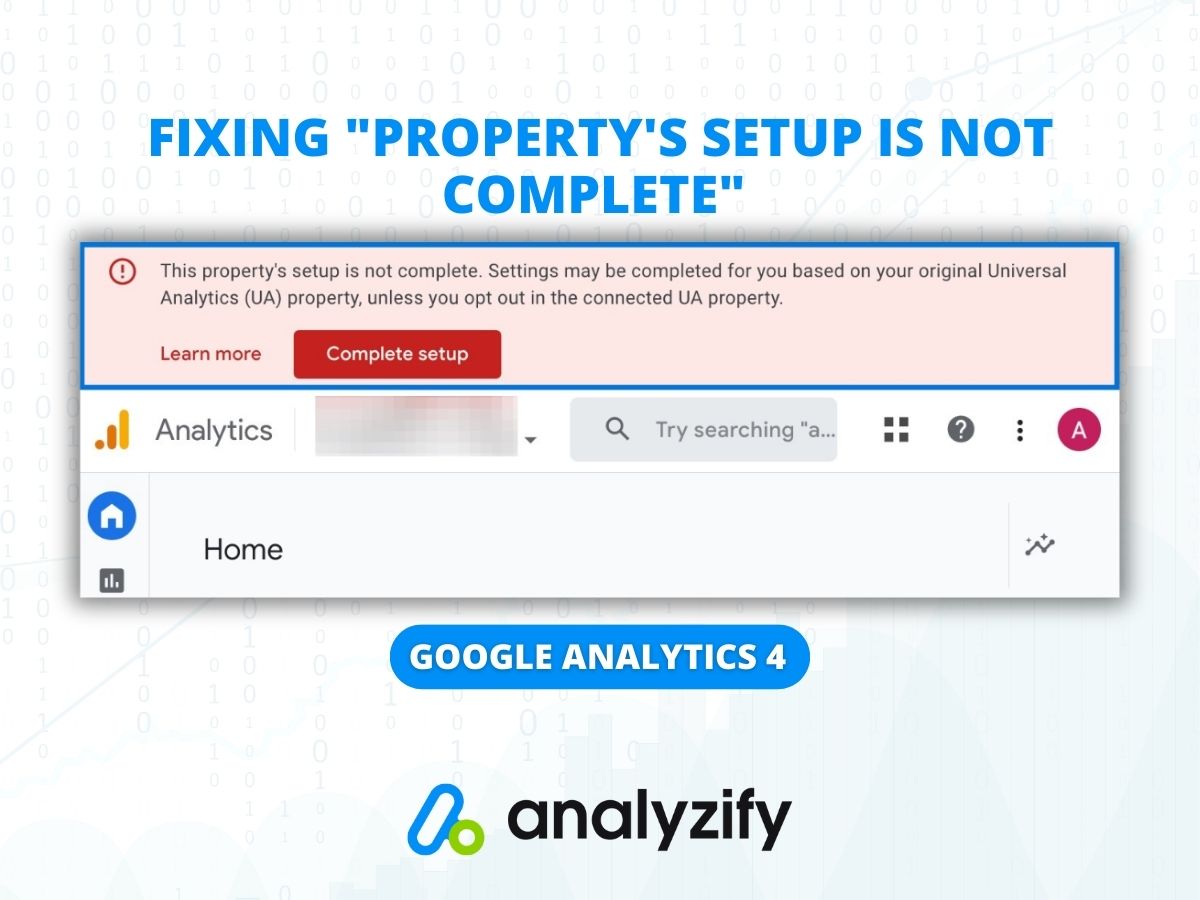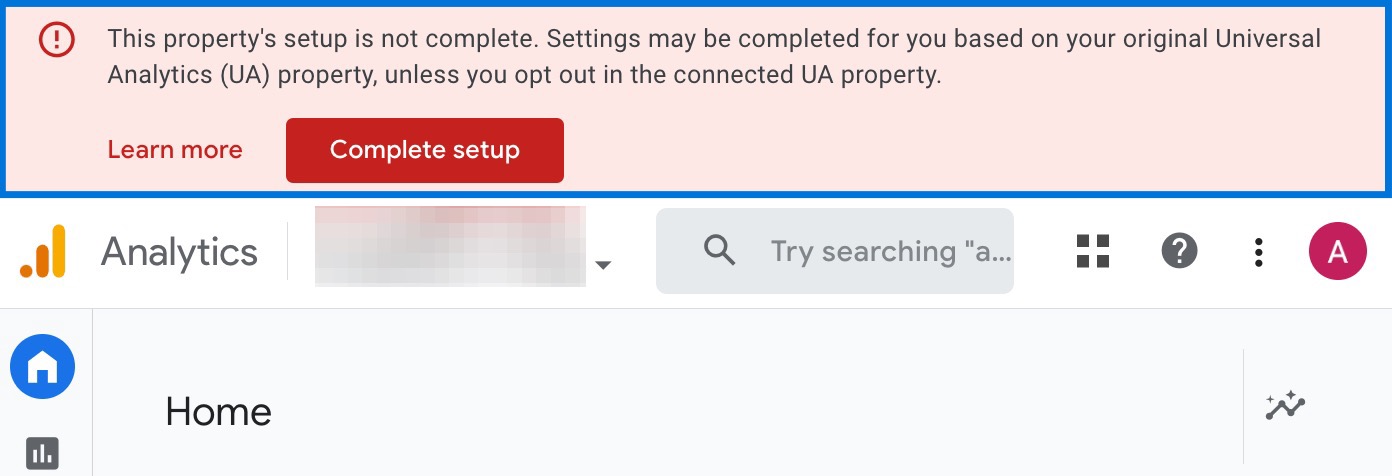Google Analytics 4 (GA) is your latest and greatest compass in the ocean of data.
Having replaced Universal Analytics (UA), it provides a lot of improved features acting as a magnifying glass to let you see every detail of your customer journey.
However, you are probably tired of seeing this warning message every time you log into your GA4 property:
“This property’s setup is not complete. Settings may be completed for you based on your original Universal Analytics (UA) property unless you opt out in the connected UA property.”
Well, although it can be confusing and frustrating especially if you don’t know what it means and what to do about it, Google displays this message due to your incomplete migration process from Universal Analytics to GA4.
It shouldn’t be a source of worry for you, though.
In this guide, you will understand all about the migration process and what you should do to get rid of this warning message by completing your migration process smoothly and successfully.
Here is a breakdown of what you are about to discover:
- The difference between GA4 and UA
- How to migrate from UA to GA4
- How to remove the warning message that appears on your GA4 property dashboard
- Tips & tricks to get the best out of Google Analytics 4
By the end of this guide, you’ll be able to take full advantage of your new default analytics solution by completing your setup to utilize its advanced reporting capabilities, cross-platform measurement, event-based data collection, privacy controls, predictive capabilities, and more.
Are you ready to get started? Let’s dive in!

GA4 vs. UA Compared: What is the Difference?
Let’s start off by exploring more about Google’s latest data analytics solution in order to maximize the performance of data collection & analysis.
Here is a brief comparison of GA4 vs. UA:
- Different data models: Google Analytics 4 analyzes any interaction as an event, while UA used different hit types such as pageviews, events, transactions, etc.
- New reporting metrics: You are now provided with new metrics such as active users, revenue per user, engagement time, etc., which gives more insights into user behavior and value than UA.
- More flexible & customizable: You are allowed to customize your reports, dimensions, metrics, and a lot more very easily with Google Analytics 4.
- Machine learning: GA4 leverages machine learning to automatically provide insights and trends that are relevant to your data analytics needs.
- Enhanced Googe Signals: Once you activate Google Signals, you can now monitor how users engage with your website across various devices and sessions, offering you better personalization.
If you want to dig deeper into how they work, you can click here to learn more about GA4.
Migration to GA4: “Your Property’s Setup Is Not Complete” Warning
If you have just migrated from Universal Analytics to GA4 without completing some important steps, you might constantly see a banner at the top of your page.\n\n

This is displayed because your setup/migration is incomplete according to Google.
This can be frustrating, but worry not! There is a simple solution that will help you remove the warning banner and ensure a complete GA4 property setup.
You can watch this comprehensive video to learn all about Google’s warning and the migration process:
Shopify GA4 Crash Course
In addition, here is a step-by-step guide for you to fix this problem easily, allowing you to manage your GA4 property seamlessly:
Migration is difficult but it’s not rocket science once you know what to do, and how.
If you want to see all the things you need to know & apply step-by-step in order to secure a seamless switch from Universal Analytics to Google Analytics 4, you can check out this guide to migrate from Universal Analytics to GA4.
Important GA4 Settings to Complete Your Setup
There’s always a way to improve your data quality & accuracy in Google Analytics 4, and completing your migration is one of them.
Yet, there are still some important GA4 settings that you need to configure to ensure that your data collection and analysis are accurate and reliable.
Here’s a quick look at those settings:
1- Excluding referrals: Filtering out some specific referral sources from your traffic reports helps you avoid self-referrals and attribution errors, and gives you a clear picture of where your visitors are coming from.
2- Configuring domains: This helps you specify which domains are associated with your GA4 property so you can ensure Google Analytics recognizes and attributes traffic from your specific domains correctly.
3- Activating Google Signals: Utilizing Google Signals enhances your GA4 data with information from users who have turned on Ads Personalization. This lets you gain more insights into cross-device interactions, remarketing audiences, demographics, and interests of your users.
4- Integrating with other platforms: You can link your GA4 property with other Google products, such as Search Console and Google Ads. This helps you leverage the valuable data provided by these platforms, such as organic search performance, paid search performance, conversion tracking, and more.
5- UTM settings: UTM parameters are tags you add to the end of your URLs to track the source, medium, campaign, term, and content of your traffic. This helps you measure the effectiveness of your marketing campaigns and optimize your marketing strategies accordingly.
6- Disabling default form interactions: You should disable the default form interactions that GA4 automatically tracks as events to avoid double-counting form conversions and maintain data accuracy.
7- Re-adjusting Session Timeout and Time for Engagement Sessions: Re-setting these two allows you to improve the accuracy & quality of user interactions, and track user engagement more effectively.
8- Filtering Out Internal Traffic: You should exclude internal traffic to prevent internal traffic from causing inaccuracy in your data.
By applying these settings correctly, you can improve the data accuracy and quality in GA4 and gain more valuable insights into your website performance.
If you want to learn how to do that, you can take a look at our step-by-step guide on how to apply the important GA4 settings.
Conclusion: How to Fix “Property’s setup is not complete” Warning in GA4
GA4 is not just an upgrade, it’s a revolution in many aspects.
In order to leverage its power and the future of measurement, you should learn all about the migration process as soon as possible.
Also, before you can enjoy the benefits of Google’s new default analytics solution, you should know how to fix the warning that says “This property’s setup is not complete”, and complete your migration process smoothly and successfully.
Now that you have this knowledge, you can start gettings the best out of your Google Analytics 4 for better tracking and & data accuracy - plus advanced ecommerce reporting capabilities.
Now it’s your turn to take action and start taking full advantage of your Google Analytics 4!

































